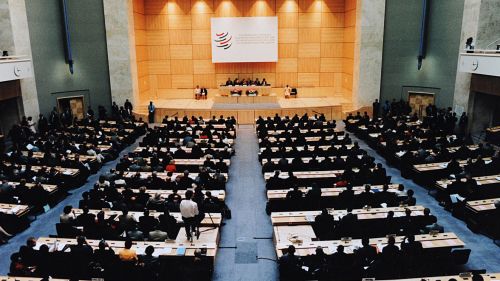Adieu, World Trade Organization

Despite the Trump Administration’s objections to the WTO, the American public is not so quick to decry this international institution.
World Trade Organization
On Tuesday, the World Trade Organization’s (WTO) Appellate Body—the panel that rules on trade disputes between member nations—became defunct as two members’ terms expired, leaving just one member on the typically seven-member tribunal. The cause of this collapse is the United States’ refusal to approve new appointments to the body. With a minimum of three judges required to ensure the functioning of the Appellate Body, there is no longer an official court to rule on trade grievances in the international economic system.
President Donald Trump has long accused the WTO of unfairly targeting the United States, despite the country winning a higher proportion of cases than it has lost. In 2018, he went so far as to threaten withdrawing from the WTO. Despite these objections to the WTO from the government, the American public is not so quick to decry this international institution. Asked whether the United States should comply with a ruling against it in the trade dispute mechanism, 77 percent of Americans believe that the United States should comply with that decision. Moreover, this is a bipartisan consensus: majorities of Republicans (65%), Democrats (87%), and Independents (76%) believe that the United States should comply with an adverse ruling.
WTO Compliance
The World Trade Organization was established to rule on disputes over trade treaties. If another country files a complaint with the World Trade Organization and it rules against the U.S., as a general rule, should the U.S. comply with that decision or not?
Source:
June 7-20, 2019 | n = 2,059
Chicago Council Surveys
Although Americans support complying with WTO rulings regardless of their outcome, this process is not—at least for now—an option for the United States. The WTO may no longer be able to act as the arbiter of international trade, but the European Union proposed in May 2019 a parallel system for dispute settlement, which would include every member of the WTO except the United States. Though this plan currently has limited support, Chinese officials have revealed that they are in talks with the EU to support this plan. Should this alternate dispute settlement mechanism materialize, it would mean leaving the United States without a means of formally challenging trade practices such as dumping and unfair subsidy practices.
It is possible that the United States will seek to join a new international trade body that it deems more favorable, but their direct part in crippling the Appellate Body may serve as a stain that precludes its membership in any like organization. Either way, the injury sustained by the WTO is another blow to the already turbulent system of international trade.

